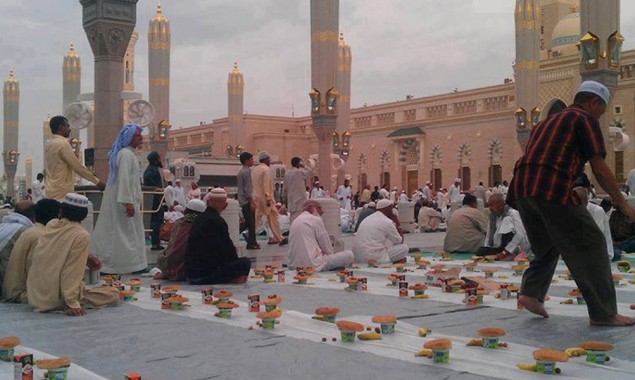Pakistani Umrah Pilgrims Dejected After New Travel Restrictions
Hundreds of thousands of Pakistani pilgrims will not be able to travel...

The Saudi government has announced that Iftar gatherings and I’tikaf will not be allowed in the Masjid al-Haram and Masjid al-Nabawi during Ramadan.
According to the reports, Sheikh Abdul Rahman Al-Sudais, the head of affairs of the two mosques, said that the Presidency would provide ready-made food to the worshipers in the Masjid al-Haram, while Sehri would not be allowed in the Prophet’s Mosque.
No one will be allowed to eat in the courtyards of both mosques and everyone will be provided food individually.
Zamzam water coolers will also not be available and 200,000 bottles of Zamzam water will be provided on a daily basis.
In addition, those who wish to break the fast in the Masjid al-Haram will only be allowed to bring dates and water for themselves and will not be allowed to share it with anyone.
Sheikh Abdul Rahman Al-Sudais announced comprehensive plans and initiatives at the annual meeting on Ramadan this year.
During the meeting, Abdul Rahman Al-Sudais said that precautionary measures would be taken during Ramadan to prevent the spread of the coronavirus, including vaccination, social distance and wearing masks to ensure the health and safety of pilgrims and worshipers.
He added that the Presidency was “fully prepared” to welcome the pilgrims and worshipers.
Elaborating on the preparations, Sheikh Abdul Rahman Al-Sudais said that the Mutafika area would be reserved for Umrah pilgrims only and five areas would be set aside inside the Masjid al-Haram and its eastern courtyard for prayers while separate prayers would be held for special persons. Will be a part of the payment.
The head of the Presidency further said that there will be translators in Masjid-ul-Haram who will convey the questions of the worshipers to the scholars and translate the fatwas, adding that there will also be interpreters in sign language during the Friday sermon.
Abdul Rahman Al-Sudais said that the purpose of all these measures is to provide a unique experience to the guests of Allah where they will be able to perform acts of worship while ensuring the safety of their health.
He said that due to the outbreak of Coronavirus, I request all the guests coming to Masjid-ul-Haram and Masjid-ul-Nabawi to get vaccinated with COVID-19 so that they can ensure the safety of themselves and other worshipers and pilgrims.
He said that more than 10,000 employees would be on duty to serve worshipers and pilgrims during Ramadan.
Travel restrictions
Earlier, according to a report in the Saudi Gazette, Saudi Arabia has suspended international flights until May 17 because pilgrims from abroad will not be able to perform Umrah during Ramadan.
The country’s General Authority of Civil Aviation (GCA) said international airports would be reopened and international flights would be allowed again from May 17 after the end of Ramadan.
Umrah and Hajj
This year, during Ramadan, Umrah pilgrims will also be allowed to perform Tawaf on the first floor.
Earlier this year, Saudi Arabia’s Minister of Hajj and Umrah had already advised those wishing to perform Umrah to be vaccinated.
The precautionary measures would continue in place, but caution was advised that all those who wish to perform Umrah should be vaccinated against COVID-19.
Other restrictions announced by the minister include wearing a mask at all times during Umrah, which will only allow people between the ages of 18 and 50 to pay for it, and maintaining social distance.
Meanwhile, according to Al-Arabiya, those who wish to perform Hajj and Umrah will have to be vaccinated on the first day of Ramadan.
Last year, Saudi Arabia hosted the Hajj in late July for the first time in modern history due to the coronavirus, with only a few thousand people attending the Hajj, instead of 3 million.
After a gap of seven months, in October 2020, the ban on performing Umrah was partially lifted and 6,000 pilgrims were allowed to perform Umrah daily.
Since then, more than 13 million masks have been distributed among worshipers at the Grand Mosque and the Prophet’s Mosque.
Catch all the International News, Breaking News Event and Latest News Updates on The BOL News
Download The BOL News App to get the Daily News Update & Follow us on Google News.